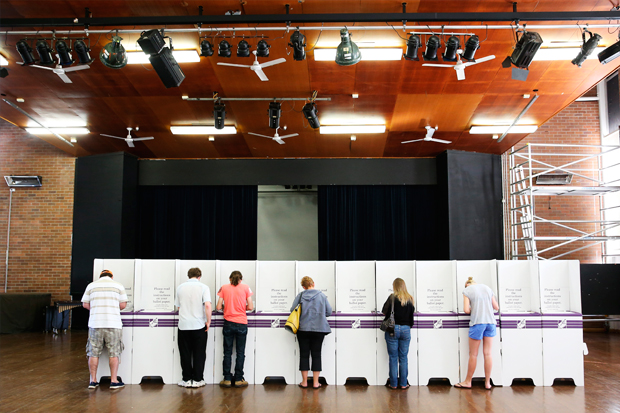Here at the Spectator Australia Electoral Reform Unit, we certainly had our hands full in 2016, what with Brexit, and elections here and in the US. We have also been busy giving advice on various referenda proposals and the same-sex marriage plebiscite. Now, as recent elections produced results that were neither expected nor acceptable, one of my projects at the Unit is to collect ideas on how elections can be improved to produce a better and more acceptable result. As soon as I announced we were working on this exercise and had set up a Stakeholder Relations Security Room run by the ABS and IBM, I got one proposal after another. Fortunately, there is no end of suggestions as to how elections should be conducted to get a truer picture of the real intentions of the electorate, even if those intentions are contrary to those expressed in the polling booth. And I’m sure it is just a coincidence that those making suggestions had just lost an election. But here at the Unit we welcome all ideas, and I am sure they are all well meant, no matter how absurd.
The first reform (which the ABS lost in the tea room but subsequently found with the office betting slips for the Melbourne Cup) was the same-sex marriage plebiscite, referred to by some of the wits around the office as the S&M. Under this reform, those in support of a change to the law fight to the death to prevent a vote taking place at all, on the grounds, first, that the few people affected by it will probably commit suicide if the issue is mentioned in public and, secondly, that all such polls are divisive and upsetting and are better not held at all. In other words, sometimes it is safer, and more conducive to producing the desired result, not to let the people have a vote at all, just in case they decide to vote the wrong way or think they will lose the vote if the plebiscite takes place. That is the ALP and Greens method, based on the assumption that they know best; although, in fairness to them, they are probably right when they say that a poll of 1,000 people who answer the telephone is just as accurate as a plebiscite where millions vote in private. As far as our Historical Division can tell, this proposal originated as the Cuban Expression of National Solidarity, under which no elections are conducted every ten years and with only one candidate per electorate, which makes the result clearer.
The second reform is a variation on S & M and requires the other side to agree in advance that, if the result is the one you want, it must be accepted automatically and put into law. This proposal came in a submission from the Rudd Institute and the ABC. You have to be careful about that variation because you do not want to bind yourself to an unwanted result. However, the advocates of same-sex marriage have covered themselves against that contingency; if the result is ‘no’, it will simply be declared unacceptable, not binding on anyone and put on hold until another vote can be held when the people have come to their senses. That reform, in turn, has its well-spring in the EU referenda method, which is the third proposal we have received. Under that method, voters certainly have a vote, but have to keep on voting until they produce the right result, which is determined for them by the EU itself. This might sound circuitous, but it has a lot to commend it when people perversely insist that they do not want to be ruled by bureaucrats in Brussels who want to flood the continent with Muslim refugees. Moreover, the virtue of this method is that it can be adapted to changing circumstances; for example, it is now the solution of choice for many governments, futures brokers, think tanks and the Clinton Global Initiative, who quite rightly are desperate to find a way of negating the irresponsible UK decision on Brexit which was clearly not wanted in London. Fourthly, we received an interesting proposal from the Vanstone Institute, under which you ignore the results in electorates where people voted against you when they should have voted for you, and include the results in electorates where people did not vote for you but should have, and indeed would have, if they had had a more enlightened and responsible attitude. This proposal has the advantage of having been used with success in the recent Australian election where it showed, according to painstaking research by the Vanstone Institute, that Mr Turnbull’s recent disastrous result was really a stunning victory.
The US election has added several new reforms to our collection. They are very potent in our view and have already been put to very good use by right-thinking Hillary supporters who have understandably been provoked into weeping and writing letters to the New York Times. One such reform is that in any rational assessment of the result you should ignore the votes of whites, males, workers without college degrees and all those who live outside New York or California. Our research has shown that carrying out that exercise can bring about an entirely different result and one that is more a true reflection of the will of the people than the stick-in-the-mud method of counting the votes of all voters, favoured only by neo-fascists, racists, Islamophobes and homophobes. Another proposal is that Mr Trump’s election should be declared invalid because he only won by the method decreed by the law, namely the electoral college vote, supported by everyone since 1776.
However, we do not want to get caught up in legal mumbo jumbo when there is another more direct and effective reform on offer, namely crying ‘He’s not my president’ and that the result is simply unacceptable.
We certainly have our work cut out for 2017.
Got something to add? Join the discussion and comment below.
Get 10 issues for just $10
Subscribe to The Spectator Australia today for the next 10 magazine issues, plus full online access, for just $10.
You might disagree with half of it, but you’ll enjoy reading all of it. Try your first month for free, then just $2 a week for the remainder of your first year.















Comments
Don't miss out
Join the conversation with other Spectator Australia readers. Subscribe to leave a comment.
SUBSCRIBEAlready a subscriber? Log in